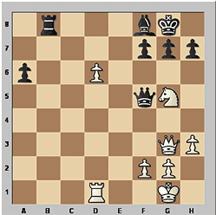McKenzie High has issued a glorious challenge to West Demerara Secondary for a face-off between the two. West Demerara has been requested to field 20 of its strongest players, and chess coach Vishnu Rampersaud, cheerfully and without hesitation, has accepted the challenge.
McKenzie’s chess coach George Daniels has already swung into training mode with his team. A date for the clash has not as yet been set, neither has a venue been identified for the match. These matters, however, will be finalised in due course.
Chess has been part of the curriculum for most Russian schools for some fifty years. Adolescents were encouraged to play chess at an early age to increase their reasoning capacities. The gifted students were chosen, and studied under the supervision of former world champion Mikhail Botvinnik, the founder of the world’s most famous chess school, The Botvinnik School of Chess.
In the US and Canada today, chess is offered widely in schools from the elementary level. Instructors are often professional chess players hired by the school board to teach part-time during the week. I know of at least three former Guyanese chess players who are teaching chess in schools in New York. The developed countries have come to the realization that chess increases strategic thinking skills, stimulates intellectual creativity and improves problem-solving abilities while raising self-esteem.
Students who play chess are trained to analyze their actions and consequences, and visualize future possibilities. Often, these students excel in mathematics and science and gradually improve their reading skills.
No one can dispute that we now live in a changing world. But technology offers hope and new opportunities for chess players and the world at large. With computer technology we can increase the number of chess players in Guyana, and perhaps influence their manner of thinking to become more strategic, intelligent and sophisticated. This is a great challenge for the administrators of chess in this country, and the manner in which we react to these challenges will determine the shape of our society, and ultimately, the shape of our future.
Chess integration in the school curriculum will help to shape our young people educationally and socially, and prepare them for the challenges ahead. Minister Dr Frank Anthony is convinced that with hard work and perseverence in studying and playing chess, we can produce a grandmaster. If we do so within a reasonable time-frame, we may have the distinct and rare honour of becoming the first Caricom country to produce a grandmaster. Simultaneously, the image of Guyana would be enhanced in an incredible way within the boundaries of the chess world, where a few hundred millions on the planet play the game. Never again would Guyana be standing on the periphery of the world’s chess circle.
Recently, we experienced the unusual talent of 16-year-old Taffin Khan, the current National Junior Chess Champion of Guyana. In the National Chess Championships, he played 14 games and won them all, handsomely. In the Topco Juice Mashramani tournament, he stunned National Champion Kriskal Persaud with some extraordinary combinative play. Taffin is ready for overseas combat, and the federation is considering sending him to represent Guyana at the Suriname Chess Open Tournament later in the year. The Suriname Open is a FIDE (World Chess Federation)-rated tournament featuring players from Aruba, Barbados, Jamaica, the Bahamas, Trinidad and Tobago, etc.
Taffin, undoubtedly, is the future. His success would serve as an inspiration for our youth who play the game. His father David Khan is his mentor and chess coach. Taffin’s smaller sister Crystal Khan, won the National Schools Championship.
Kasparov has argued that chess belongs to the young people. During a recent visit to India, he told the Mail Today that he didn’t expect Vishy Anand to continue winning for long. “Vishy is a brilliant player. But it is very difficult to compete at 40. He is up against people half his age. I will be surprised if he can go on any longer.” Anand defends his world championship title against Bulgaria’s Veselin Topalov later this year. In contrast to Kasparov’s view, however, I am of the opinion that Anand is going to retain his title.
The first event of the FIDE Women Masters 2009/2010 Grand Prix cycle is currently being held in Istanbul. After seven rounds, the 15-year-old Chinese prodigy Hou Yifan has amassed a total of 6½ points and an incredible 2905 rating performance. Her colleague Zhao Xue was close behind on six points. The two girls met in the eighth round and Hou lost her first game of the tournament. She blundered in the diagrammed position and lost her passed pawn.
Hou v Zhao
Hou Yifan (2571) – Zhao Xue (2508)
FIDE Women’s Grand Prix Instanbul TUR (8), 15.3.2009

It happens all the time: the time control looms fiercely, the player makes – well simply a move. 40.Kh2? The tide turns, this move loses a pawn: 40…h6 41.Nf3 and now the knight can no longer be used to defend the all-important d-pawn, which was supposed to get yet another point for the young chess phenomenon. 41…Rd8 42.Kg1 Qe6 43.Ra1 Rxd6. 44.Qf4 Qb3 45.Qc1 a5 46.Nd2 Qb5 47.Ne4 Re6 48.Nc3 Qe5 49.Na4 Bd6 50.g3 Qf5 51.Qf1 Bb4 52.Rc1 Rd6 53.Nb2 Bc5 54.Qe2 Qxf2+. A second pawn goes. The end is near. 55.Qxf2 Bxf2+ 56.Kxf2 Rd2+ 57.Kf3 Rxb2 58.Rc8+ Kh7 59.Ra8 Rb3+ 60.Kg2 Rb5 61.Ra6 h5 62.h4 Rf5 63.Kh3 g6 64.Ra7 Kg7 65.Ra6 Kf8 66.Ra7 Ke8 67.Kg2 Rc5 68.Kf3 Kd8 69.Kg2 Rf5 70.g4 hxg4 71.Kg3 Kc8 72.Kxg4 Kb8 73.Re7 a4 74.h5 Rxh5 75.Rxf7 a3 76.Rf8+ Kb7 77.Rf7+ Kb6 78.Rf6+ Kb5 79.Rxg6 Rh1 White Resigns. 0-1.





